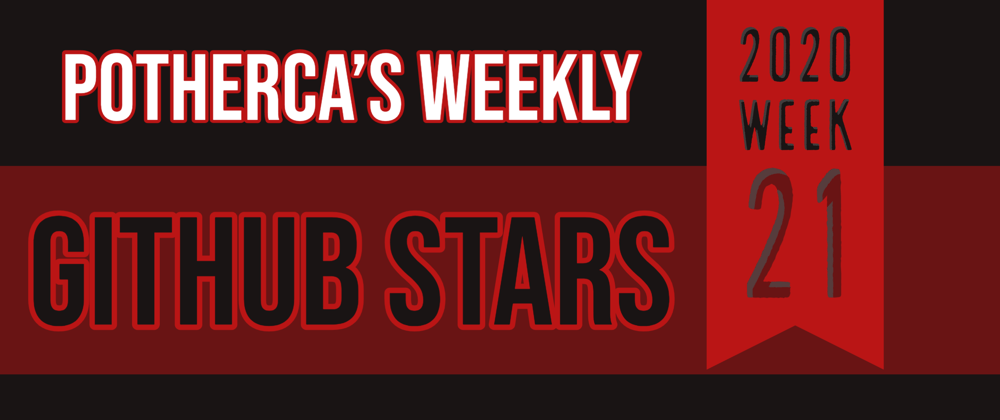Week 21
As I was still rather busy with my jobhunt this week1, I did not do much browsing and developing. For that reason there are only four repos of interest.
This week's starred repos
Back your stack
In software development, everybody is dependant on open-source. Sadly, most developers and companies don't give back to the community they rely on.
One of the barriers is that, often, people don't know who to support, or how. BackYourStack aims to remove that hurdle.
BackYourStack offers a service that scans all the repositories of an organization (or user) on Github. It then analyzes all the open-source software dependencies it finds. Next, it provides a direct link to ways those projects can be supported.
Say, for instance, we use NPM a lot and would like to contribute to the eco-system NPM uses. We can simply visit https://backyourstack.com/npm and see all of the dependencies NPM relies on.
Currently https://backyourstack.com/ is in beta and only OpenCollective seems to be supported. Nevertheless, this service seems really promising, so I starred the accompanying repo.
 backyourstack
/
backyourstack
backyourstack
/
backyourstack
BackYourStack analyzes repositories to recommend Open Source projects to support.
Discover the open source projects your organization is using that need financial support.
Our goal with BackYourStack is to make it easier for companies to identify the open source projects that they depend on that also need funding.
While we started with just node modules (as defined in package.json files) and with open source projects that are on Open Collective, we know that the open source community is much larger than that. That's why we would love to support more languages and platforms but for that, we need you!
Take a look at our public repository & Contributing Guidelines create or pick up issues and help us make open source more sustainable for everyone! 🙌
Service
The official BackYourStack service is available from https://backyourstack.com/
Development
Prerequisites
Node.js
Make sure you have Node.js version >= 14. We recommend using nvm: nvm install && nvm use
GitHub API Keys
If you…
Deno
If you are a web or NodeJS developer, chances are that you've heard about the v1.0.0 release of Deno earlier this month. In case you haven't, Deno is:
A secure runtime for JavaScript and TypeScript.
It isn't meant to be a drop-in-replacement for NodeJS, it is a completely new runtime, written in Rust.
Last week I finally got around to reading up on this new creation by the original developer behind NodeJS and it is looking real good. It isn't feature-complete enough to push NodeJS from its throne soon, but in the long run it could become a viable (easier and faster) alternative to run server-side JS.
Visit https://deno.land/ and read up if you haven't yet. Regardless, that gotta be starred!
Deno
Deno
(/ˈdiːnoʊ/, pronounced
dee-no) is a JavaScript, TypeScript, and WebAssembly runtime with secure
defaults and a great developer experience. It's built on V8
Rust, and Tokio.
Learn more about the Deno runtime in the documentation.
Installation
Install the Deno runtime on your system using one of the commands below. Note that there are a number of ways to install Deno - a comprehensive list of installation options can be found here.
Shell (Mac, Linux):
curl -fsSL https://deno.land/install.sh | sh
PowerShell (Windows):
irm https://deno.land/install.ps1 | iex
Homebrew (Mac):
brew install deno
Chocolatey (Windows):
choco install deno
Build and install from source
Complete instructions for building Deno from source can be found in the manual here.
Your first Deno program
Deno can be used for many different applications, but is most commonly used to build web servers. Create…
How They Test
Have you ever wonder which path has led some of the major players to their current quality culture? On
https://abhivaikar.github.io/howtheytest/, you can find all of the blog posts, articles and other resources that describe just that. Usually you would have to scour the internet to try and get a coherent picture, but no more! How They Test has gathered these resources for you and grouped them together for companies like Airbnb, Amazon, Apple, and Atlassian. And that's just the "A"!
As not to forget to come back to those resources, this repo got starred!
 abhivaikar
/
howtheytest
abhivaikar
/
howtheytest
A collection of public resources about how software companies test their software
How They Test
A curated collection of publicly available resources on how software companies around the world test their software systems and build their quality culture.
Foreword
One of the outcomes of the various Taqelah meetups was that many software companies got to share their testing and quality culture with the community. It was absolutely fantastic to see the amazing stuff companies are doing to test their software, and ensure quality of their products and platforms.
Apart from this, many companies regularly come forward and share their best practices, tools, techniques and culture of software testing on various public platforms like conferences, blogs & meetups. The resources are there but dispersed, lost into the internet.
There is no single knowledge repository that gives a direct look at these best practices, tools, techniques and culture of software testing these companies adopt. This repository intends to do that.
Happy Learning!
Please note,…
semsol/arc2
Besides everything else I've got going on, I am also delving into the distributed web. If you don't know what that means, think of it as the internet without silos (like Google, Facebook, Amazon, or your ISP) having total control over any part of it. In the distributed web, all parts can be swapped out at your choice.
Where I was looking at the InterPlanetary File System (IPFS) a couple of months ago, my attention is currently on Solid. In a nutshell, Solid would allow you to manage your data and authentication yourself. Other services (like Google, Facebook, and Amazon) would then connect to your data or login provider, rather than those things being with them.
This topic has lead me to star more repos before, and although the star-storm that started in week 17 has settled down, I found another semi-relevant repo.
Part of Solid is file (meta)data, like RDF. ARC2 is a PHP7 library for working with RDF. It also provides a MySQL-based triplestore with SPARQL support. If that sounds too technical or boring to you, it probably is and you can safely ignore this repo.
For me, it held an interest, so it got starred.
ARC2
ARC2 is a PHP 8.0+ library for working with RDF It also provides a MySQL-based triplestore with SPARQL support Older versions of PHP may work, but are not longer tested.
Test status:
| Database | Status |
|---|---|
| MariaDB 10.5 | |
| MariaDB 10.6 | |
| MariaDB 10.9 | |
| MariaDB 10.10 | |
| MariaDB 10.11 | |
| MySQL 5.5 | |
| MySQL 5.6 | |
| MySQL 5.7 | |
| MySQL 8.0 |
|
| MySQL 8.1 |
|
Documentation
For the documentation, see the Wiki. To quickly get started, see the Getting started guide.
Installation
Requires PHP 8.0+.
Package available on Composer.
You should use Composer for installation:
composer require semsol/arc2:^3
Further information about Composer usage can be found here, for instance about autoloading ARC2 classes.
RDF triple store
SPARQL support
Please have a look into SPARQL-support.md to see which SPARQL 1.0/1.1 features are currently supported.
Known database problems
MySQL 8.0+
The following error occurs when using a REGEX function…
Closing notes
That was all for this week. See you next time!
Footnotes
- I've narrowed things down to three companies. With a bit of luck I'll be making a final decision in the coming week.















Top comments (0)